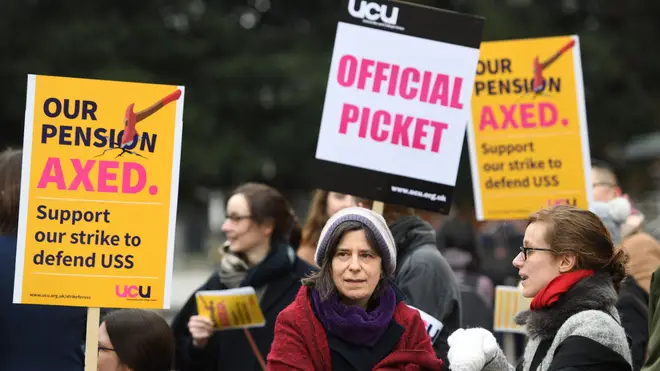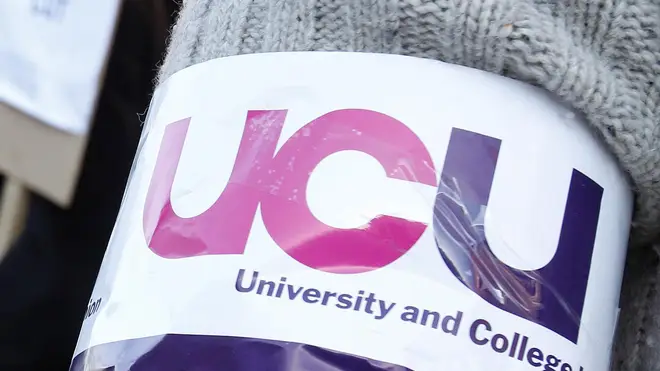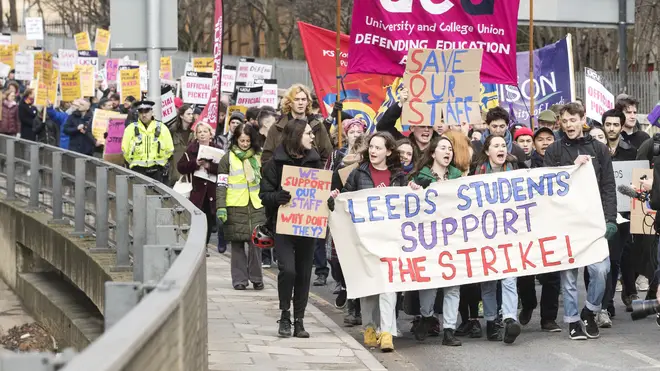
Shelagh Fogarty 1pm - 4pm
25 November 2019, 05:12
Thousands of university staff will walk out for eight days from Monday in a move which will disrupt lectures for over a million students.
Up to 43,000 members of the University and College Union (UCU) at 60 UK universities will strike, in disputes over pay, conditions and pensions, with further industrial action being threatened if agreements cannot be reached.
As well as eight strike days from 25 November to Wednesday 4 December, union members will begin 'action short of a strike'.
This involves things like working strictly to contract, not covering for absent colleagues and refusing to reschedule lectures lost to strike action.

Those going on strike include lecturers, student support services staff, admissions tutors, librarians, technicians and administrators.
UCU general secretary Jo Grady warned that a second wave of strikes could be held in the new year if the deadlocked disputes remain unresolved.
University leaders say they will try to lessen the impact of the action and insist they want to work with the union to reach an agreement.
But the UCU said staff had reached "breaking point" over a number of issues, including workloads, real-terms cuts in pay, a 15% gender pay gap and changes to the Universities Superannuation Scheme (USS), which the union says will leave members paying in more and receiving less in retirement.

Many universities were also employing academic staff on "discredited" zero-hours contracts, said the union.
The general secretary of the University and College Union - Jo Grady - has told LBC they're at "breaking point" over changes to the pension scheme and other issues.
"The employers seem to want to test the mettle of staff and see if they will turn up on picket lines," said Ms Grady.
"It is really unfortunate they have decided to do that because they are misjudging their staff. More and more people are joining the union and there is a real feeling of anger.
"There could be a second wave of strikes if we don't get a long term, sustainable offer and universities refuse to take our concerns seriously."
Carol Costello, the spokesman for the employers' side, said: "We will do all we can to ensure the strike does not impact badly on students and staff.
"The action and claims of the UCU that employers are forcing them into this cannot go unchallenged."
The union was insisting that employers should pay the full cost of an increase in pension contributions and had not been prepared to compromise, she said.
"It has been a complete red line for them and has made negotiating impossible.
"It suggests a lack of willingness to recognise the reality of the situation.
"Employers are prepared to invest in our people, but unaffordable sums of money would have to be diverted from other budgets unless individual members make a fair contribution."
This could include cuts to courses and larger class sizes, which would have a damaging impact on students, she said.
She maintained that university employers were committed to ensuring staff had access to one of the best pension schemes in the country.
Universities were working hard to ensure that students do not miss out or are disadvantaged by the strikes, she added.
University leaders have written to the union outlining their commitment to deliver long-term reform of the USS.
The strikes will take place on five days this week, and again for three days from December 2.

One international student, Xiaying Dong, said it was the students who are "victims" of the industrial action, writing on the UCU website they said: "We all know that it is students who are actual victims in the strike. As an international student, my comment on studying experience in UK will become more negative thanks to this strike."
Shadow education secretary Angela Rayner said: "Fair pay, secure contracts, reasonable workloads and decent, affordable pensions should come as standard for all those working in education, including in our universities.
"Thousands are on strike today because that simply isn't the case in the increasingly marketised system that the Tories have created. Labour will end the failed free-market experiment in education and instead put staff and students first.
"It is time for the employers to put their students first and avoid any further disruption by bringing a reasonable offer back to the negotiating table."